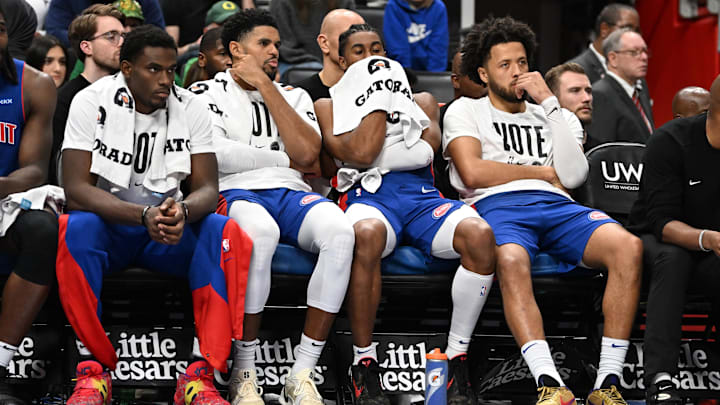Overpaying the wrong players can lead to financial disaster in the NBA, something Detroit Pistons team president Trajan Langdon has demonstrated he understands with recent comments.
This is why he’s being cautious with extensions for Jaden Ivey and Jalen Duren and said, according to Keith Langlois of Pistons.com, that they wouldn’t be getting new deals unless the money matched their contributions on the court.
It’s something we’ve talked a lot about since the application of the new tax rules made it punitive for teams to get into the luxury tax, especially if they are not even competing for a title.
This is why some of the recent trade proposals we’ve seen are particularly risky for the Pistons, as paying an injury-prone player like Lauri Markkanen $50+ million a season could quickly wreck the finances; ask the 76ers, who have $106 million tied up in Joel Embiid and Paul George next season.
Duren and Ivey aren’t in that category but still have a lot to prove before the Pistons can commit. The contracts and contributions have to match, so what does that mean specifically for these two players?
Fair contacts for Jaden Ivey, Jalen Duren and the Detroit Pistons
I am sure there is a number out there the Pistons would jump at for both of these guys, but it’s probably far from what they are seeking, and both players may be inclined to play out the season and hope for a bigger payday if they play well.
John Hollinger’s system had Jaden Ivey valued at $10 million a season, a deal the Pistons would sign in a heartbeat, but Ivey is going to point to players like Immanuel Quickley and say I want $30 million plus, a number he clearly hasn’t earned yet, as that is second star money and Ivey is not there.
Is there a number somewhere in the middle? Four years, $80 million seems like a fair middle ground, but Ivey may be inclined to play out the season and potentially get more.
Jalen Duren is a similar situation, though I think the Pistons are more comfortable in their knowledge of what he is and what he can be. Like Ivey, Duren will point to some of his contemporaries and want a similar deal, which is somewhere in the range of $25 million per season.
That’s a heavy investment for a guy who is not yet an elite defender and has a limited offensive bag, so the Pistons' current offer is likely much lower.
Langdon is clearly open to rewarding these players with contracts, but only ones that match what they have achieved, not based on what they might, so we may not see a resolution before the October deadline.
